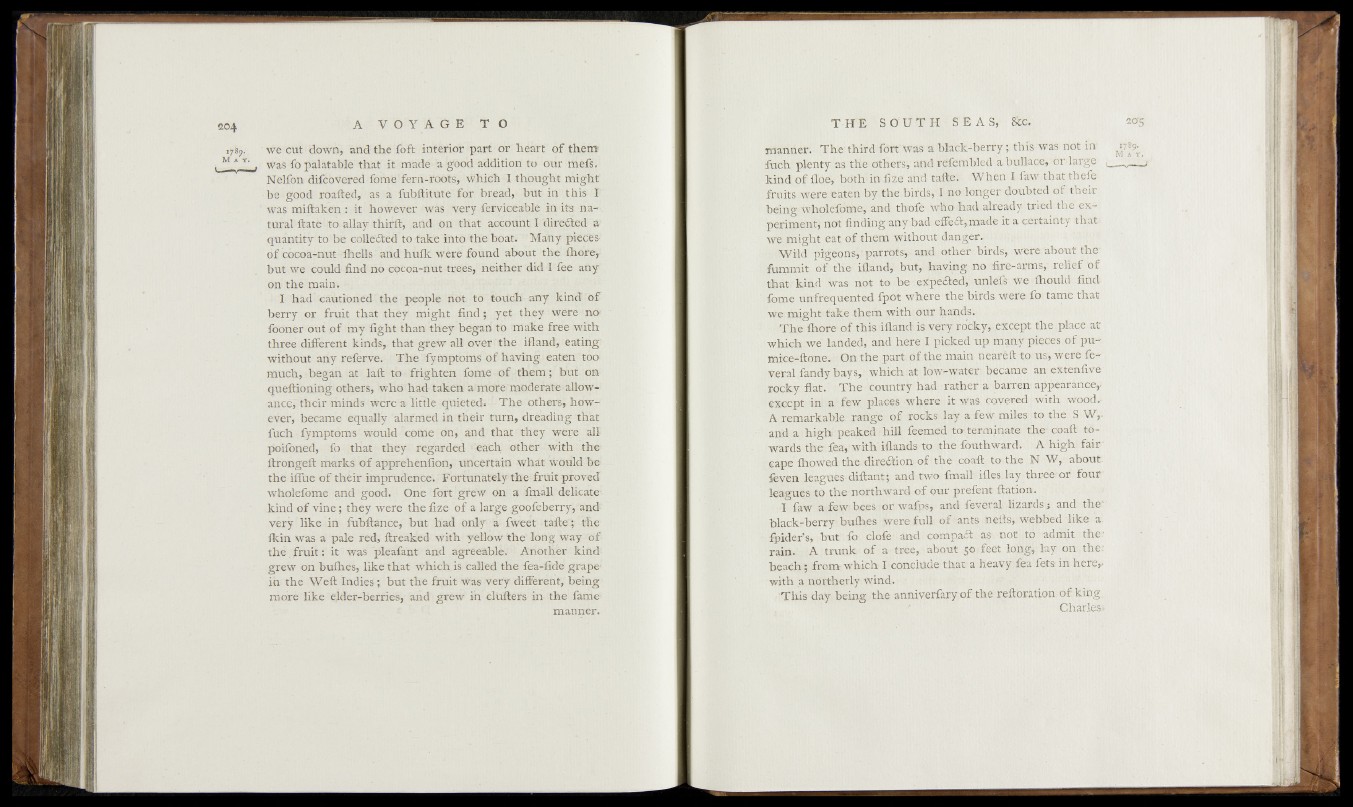
204
MWaslmy.
A V O Y A G E T O
we cut doWb, 'aa#<he !fbfb• irrtl^cfr'qjarf- c f c - o f then*
was fo palatable that it fmade» a «good addition to our thefs.
Nelfon< difcoVered fome'fern-fobts, which I thought might
he-good roafted, as a fubftitute' for bread, but-i n ' 1 this I3
was miftaken, :,-jt howbver was very ferviceable itykg- natural
ftate to allay thifft, and on that account. I dire6ted a*
quantity to1 be colle'dtedto take into the boat. ' Mahypiecfcs-
of coGoa-n«t Shells and:hulk were found aboutftfl^ihbrer
but We couM- find no cocoa-nut trees, neither did Pfee any
on the main. •
i I had cautioned' the people hot to touch any kind o f
berry or fruit that they might find; yet they Were'no*
looner out p f my^fight than they began to miakq free with
three different kinds, that gfew all over*'-the ill and, eating:
without any relerve. The -fymptornS of having ‘ eaten ’ too-
much, began at luft to frighten fome of them; but on
queftioning others, who had taken armb’re'modefate allow-
ance,~ their minds were a little quieted. The others^ however,
became equally alarmed in their turn, dreading’that
fuch • fymptbms would come bn, and that they were all*
poifoned, fo that they" regarded »'each Uthcr with the
ftrongeft marks o f apprehenfion, uncertain what Would be;
the iffue o f their imprudence..- Fbrtunately thedruit proved
wholefome and good. One fort’greW bn a frnalkdeikate^
kind of vine; they were the fize of a large gooseberry, an#
very like in fubftance, but had fweet tafte; .thefkin
was a pale red, ftreaked with yellow the1 long Way ‘ofi
the fruit: i t ' was pleafant and agreelblb. • Another kifid-
grew bn hufh^, like that which is called the fea-fide gripe5
in the Weft Indies; but the fruit was very different, being
more like elder-berries, and grew in clufters in the fatties
manner.
T H E S O U T H SEAS , &c. 20“5
mariner. The third fortWas* a black-berry; this was not in -Mm
fuch plenty as the others, and refembled a tmllace, or large ,--- ,—_
kind of floe, both in fize and tafte. When I faw that thefe
fruits iwere°eaten by, the birds, I no longer doubted of their
being wholefome, and thole who had afreadyufried^the experiment,
not finding any bad effe'^made it a certainty that»
we might eat of them withotatldanger.'■o
$ Wild’ pigeons;? parr©f and- - other birds!,- werh about 'the
fummit ®f flie/ i'ftahdf bUty .having: no hre-arms,-. relief
that, kind was npt -to-be eX'pedted,.unleifs we 'fhould.-fiild-
fome unfrequented, fpot where the birds wefle fo tame that
we might fake them with-our hands .-
The.fhoreof this ill and is very ipeky ^except the .place-at
which we' landed, and here.I picked up many piefcesnf pu-
mice-ftone. On the part-, of the main nbarefbto'us, were
veralfiandy bays,? wh-inhik-low^watert..bBcarne. ^n eXtenfiVe ,
rocky flat/ rThe- toUntty had rather »/barrem-appearance,/
except in a few places where it was covered with wooth
A remarkable' rattget.o-f rofcksv lay a-;feW- miles;)to. the S W,.
and a * high-peakedr hill feemed ter terminate t-he^ebafts to- ,
wards the- fea,wfthiflands to^hpifo^hw&f d^^'&i-gh1. fair
cape fho.wed; therdire<ftiomof' the-noaft|h^the-;.M /W,-about
leven leagues-diftant; and two-fmalbifles;lay three-or four
leaguesjjtp.themorthward of our prefent ftation. ;
I faw atrfeiybeestpr wafps, and fevbral lizards* and the!:
black-berry: bulhes were full of <[anfes neftsy; wjebbed like a.
fpider’s, but fb dole and compaduas not-.to admit the
rain. A trunk of a tree, about 50 feet long, lay on the:
beach; from which I conclude that a heavy lea lets-inhere,»
with a ndrtherlyWind. ft
-This day being the anniverfary of the reftbrationof- king.
. 1 * *" ' - ' ‘ ■ ’ ■ Charles!